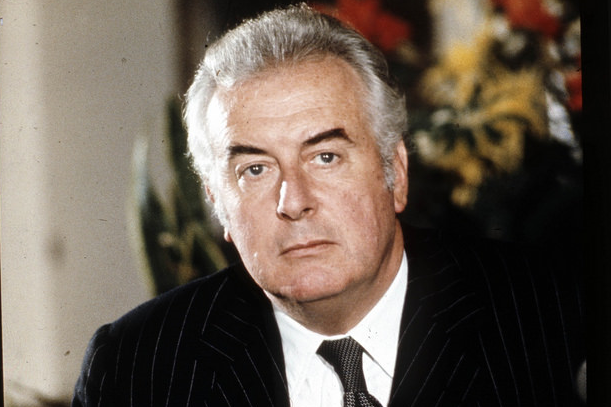Gough’s remaking of foreign policy
Posted By Graeme Dobell on October 22, 2014 @ 15:47
 [1]Gough Whitlam helped Australia think about finding its security in Asia, not to seek security from Asia.
[1]Gough Whitlam helped Australia think about finding its security in Asia, not to seek security from Asia.
Not least of Whitlam’s achievements was to make Australia colour-blind, in both word and deed. Harold Holt’s government, in 1966, started a quiet—almost covert—dismantling of the White Australia policy with camouflage language about ‘flexibility’. Whitlam’s government used trumpets and drums to kill the White Australia policy as loudly as possible. To the enduring chagrin of Liberals, Labor has claimed the policy honours, based on Whitlam’s characteristically emphatic and emotionally-charged embrace of non-discriminatory immigration.
As the Vietnam War edged to its bloody end, Whitlam’s thinking didn’t retreat from the region along with Australia’s troops. He wrote in his memoirs that ‘forward defence’ was based on the ‘xenophobic belief that Australia was best defended from Asia’. That ‘defended from Asia’ line reflected several layers of Oz nightmare.
Whitlam’s dismantling of immigration xenophobia was mirrored in his language on defence:
We do not see Southeast Asia as a frontier where we might fight nameless Asian enemies as far to the north of our own shores as possible—in other people’s backyards.
In his policy speech for the 1972 election, Whitlam committed to diplomatic recognition of China, an end to military conscription and the maintenance of the alliance with the US as one of Australia’s ‘two great associations’ (the other was the Commonwealth). Whitlam made four foreign policy commitments ‘commensurate to our power and resources’:
- National security—the defence-of-Australia doctrine discussed in the previous post [2]
- A secure, united and friendly Papua New Guinea—PNG became independent in 1975
- Closer relations with our nearest and largest neighbour, Indonesia
- Promoting peace and prosperity in our neighbourhood: ‘We should be the natural leaders of the South Pacific’.
Whitlam set a pattern for Australian commitment to the region and Australian support for regionalism that has been sustained by every subsequent government. No less an authority than John Howard nominates Whitlam as the foundational leader for the Great Asia Project [3] that has united every leader since 1972.
Whitlam’s regionalist wins were minor (Australia as ASEAN’s first dialogue partner) compared to later achievements, especially the Hawke government’s creation of APEC and the Howard government’s seat at the East Asia Summit.
But the language and the orientation Hawke used and Howard utilised drew directly from Whitlam’s effort in his first days in office to create an Asia Pacific forum. That forum idea was quickly killed off by Indonesia, in an early demonstration of the veto ASEAN could wield over regional initiatives from Canberra.
Outlining his Asia forum idea in January, 1973, Whitlam said he didn’t want to change and enlarge ASEAN, but to create a broader regional association for Asia and the Pacific, to develop ‘a truly representative regional community’. That grouping should include all of ASEAN and, in line with ASEAN language, Whitlam said it would ‘insulate the region against ideological interference from the great powers’.
The following month, Whitlam flew to Jakarta ‘to demonstrate the political and economic interest that Australia would now take in the region’. Whitlam later remarked that Suharto was ‘frank’; indeed he was. Indonesia’s President said there weren’t enough common interests within Asia for Whitlam’s forum to be practicable. The Australian record quoted Suharto as doubting the ‘usefulness of a formal conference or organisation. This would only aggravate conflicting interests. ASEAN also needed to be consolidated beforehand’. Suharto said he wouldn’t want India as a member of an Asia Pacific grouping and there’d be questions about Chinese participation. We’ve all come a long way since then, and the journey has reflected Whitlam’s vision, not Suharto’s fears.
Whitlam’s final-and-forever embedding of a non-discriminatory immigration policy stands as a supreme achievement, domestically and internationally. It was as foundational in its meaning for Australian foreign policy as the opening to China, so well described by Ross Terrill [4].
Whitlam’s embrace of Indonesia was equally fundamental; Tony Abbott’s presence at the inauguration of Indonesia’s President testifies to the continuing strength of this policy strand. Ironically, Whitlam’s successful embrace of Suharto became his foreign policy nemesis—East Timor.
Whitlam put two points to Suharto in September, 1974. First, East Timor should become part of Indonesia. Second, incorporation ‘should happen in accordance with the properly expressed wishes of the people of Portuguese Timor’. As the head of Foreign Affairs, Alan Renouf, later wrote, Whitlam changed Australia’s position to a two-pronged policy when the two points were irreconcilable. Suharto embraced Whitlam’s first point and ignored the second. It took 25 years to undo the damage to Australia-Indonesia relations and the deadly costs for East Timor.
Whitlam’s East Timor blunder stemmed from his ambitions for Australia in Asia. The Timor stain touches the edge of the Whitlam toga, but it doesn’t gainsay that he was a big man who dreamed big dreams of Australia’s role in its own region. Gough Whitlam did much to launch Australia’s Great Asia Project and much that he dreamed has come to pass.
Graeme Dobell is the ASPI journalist fellow. Image courtesy of Flickr user Carl Guderian [5].
Article printed from The Strategist: https://aspistrategist.ru
URL to article: /goughs-remaking-of-foreign-policy/
URLs in this post:
[1] Image: https://aspistrategist.ru/wp-content/uploads/2014/10/Gough-Whitlam-1973.png
[2] previous post: https://aspistrategist.ru/goughs-remaking-of-defence-policy/
[3] Great Asia Project: http://www.lowyinterpreter.org/post/2010/11/04/The-Great-Asia-Project.aspx?COLLCC=3003095240&
[4] described by Ross Terrill: https://aspistrategist.ru/reflections-on-whitlam/
[5] Carl Guderian: https://www.flickr.com/photos/bjacques/15509666275
Click here to print.